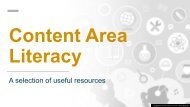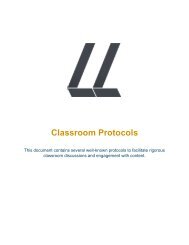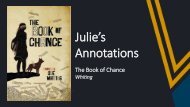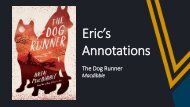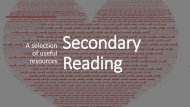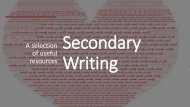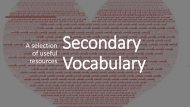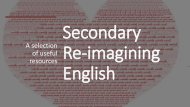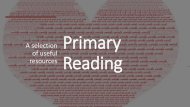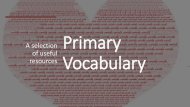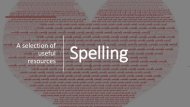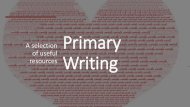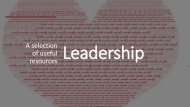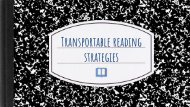Dliscpinary Literacy Resources Magazine
You also want an ePaper? Increase the reach of your titles
YUMPU automatically turns print PDFs into web optimized ePapers that Google loves.
Disciplinary<br />
<strong>Literacy</strong><br />
A selection of useful resources
This book is highly recommended for teachers and leaders who<br />
are seeking ways to ensure all teachers understand how to<br />
teach literacy in their subjects. The book guides teachers in all<br />
subjects to identify the literacy features of their disciplines, and<br />
to use that knowledge to inform their teaching.<br />
Often differences in disciplines are perceived to be one of<br />
content, but disciplinary literacy recognises that each subject<br />
has its own ways of thinking, reading, writing and speaking.<br />
Furthermore, each discipline has its own forms of writing. For<br />
example, an essay in history is quite different to one in<br />
psychology or geography.<br />
Central to the ideas in this book, is the concept of a whole<br />
school literacy culture where teachers understand the literacy of<br />
their disciplines while also the more general literacy practices<br />
that function across disciplines.
A must read for teachers in grades 6-12 who are tackling<br />
the endless challenges of literacy learning in each of the<br />
major academic disciplines.<br />
Editors Jetton and Shanahan provide an excellent<br />
compilation of solid, research-based articles, to help in<br />
the understanding of how students construct meaning in<br />
the different content domains, as well as how they use<br />
this constructed meaning in discipline-related acts of<br />
literacy.
This cutting-edge volume examines ways to help K-12<br />
students develop the literacy skills and inquiry practices<br />
needed for high-level work in different academic domains.<br />
Chapters interweave research, theory, and practical<br />
applications for teaching literature, mathematics, science, and<br />
social studies, as well as subjects outside the standard corephysical<br />
education, visual and performing arts, and computer<br />
science. Essential topics include use of multimodal and digital<br />
texts, culturally responsive and sustaining pedagogy, and new<br />
directions for teacher professional development. The book<br />
features vivid classroom examples and samples of student<br />
work.
Foundational and accessible, this book equips teachers with the<br />
knowledge, understanding, tools, and resources they need to help<br />
students in grades 4–12 develop reading proficiencies in four core<br />
academic subjects—literature, history, science, and mathematics.<br />
Applying a disciplinary literacy approach, Fang describes the verbal<br />
and visual resources, expert strategies, inquiry skills, and habits of<br />
mind that students must learn in order to read carefully, critically,<br />
purposefully, and with an informed skepticism across genres and<br />
content areas. He also shows how teachers can promote language<br />
learning and reading/literacy development at the same time that they<br />
engage students in content area learning.<br />
With informative synthesis and research-based recommendations in<br />
every chapter, this text prepares teachers to help students develop<br />
discipline-specific, as well as discipline-relevant, discursive insights,<br />
literacy strategies, and ways of thinking, reasoning, and inquiring that<br />
are essential to productive learning across academic subjects. It also<br />
provides teacher educators with approaches and strategies for helping<br />
teacher candidates develop expertise in academic reading instruction.<br />
In so doing, the book demystifies academic reading, revealing what it<br />
takes for students to read increasingly complex academic texts with<br />
confidence and understanding and for teachers to develop expertise<br />
that promotes disciplinary literacy.
Firmly rooted in research evidence of what works within the classroom for<br />
our most disadvantaged students, Disciplinary <strong>Literacy</strong> and Explicit<br />
Vocabulary Teaching offers teachers and school leaders practical ways in<br />
which those students who are behind in their literacy capabilities can<br />
make excellent progress. Kathrine Mortimore outlines the unique literacy<br />
challenges posed by specific subject areas for those with weaker literacy<br />
skills, and more importantly how these challenges can be addressed and<br />
overcome.<br />
This book draws on the success stories of schools and subjects that have<br />
made significant improvements in the outcomes of the children they<br />
teach, regardless of their starting points and draws on both whole school<br />
initiatives and subject-specific strategies which have had proven success.<br />
This book places a wide and balanced knowledge-rich curriculum at the<br />
centre of any school improvement strategy designed to improve literacy<br />
and illustrates the role that all subjects must combine to play in building<br />
the vital background knowledge and vocabulary that young people need<br />
to read independently. This curriculum must then be delivered using<br />
those teaching methods that have had the greatest impact on<br />
disadvantaged learners, and this book sets out how the methodology of<br />
direct and explicit instruction can be adopted within each subject area.<br />
There are also useful sections on creating a whole school dictionary of<br />
essential vocabulary, creating a culture of reading and writing, and also<br />
those key literacy barriers experienced by those students with some of<br />
the most common special educational needs.
A revised and expanded edition that promotes inquiry and teaching practices to help<br />
students gain the discipline-specific literacy skills they need to succeed in college, the<br />
workplace, and the society of tomorrow.<br />
In this second edition of Disciplinary <strong>Literacy</strong> Inquiry and Instruction, Jacy Ippolito,<br />
Christina L. Dobbs, and Megin Charner-Laird update their framework for guiding<br />
discipline-specific teaching and learning in K-12 classrooms. With new and revised<br />
chapters, the book outlines disciplinary literacy professional learning that not only<br />
supports the development of new instructional skills but also inspires hope, authentic<br />
engagement, and collaboration among teachers and educational teams.<br />
Ippolito, Dobbs, and Charner-Laird show how their adaptable framework, which is based<br />
on the RAND model of reading comprehension, allows educators across grade levels to<br />
embrace the language, genre, and modality of their subject areas while attuning<br />
specifically to texts, tasks, students, and classroom cultures. Offering research-based<br />
best practices, guiding questions, and concrete real-world examples, they prepare<br />
teachers to meet the demands of today's educational climate.<br />
This useful resource for professional learning demonstrates how the disciplinary literacy<br />
framework can guide both larger-scale and hyperlocal implementation. It maintains a<br />
special focus on critical disciplinary literacy work, which interweaves the ideas of<br />
disciplinary literacy with critical, culturally sustaining, and antiracist pedagogies. It also<br />
prepares educators to serve diverse student populations with specific literacy-learning<br />
needs, including neurodivergent students, deaf students, and multilingual learners.
In Closing the Reading Gap, Alex Quigley explores the intriguing<br />
history and science of reading, synthesising the debates and<br />
presenting a wealth of usable evidence about how children develop<br />
most efficiently as successful readers.<br />
Offering practical strategies for teachers at every phase of their<br />
teaching career, as well as tackling issues such as dyslexia and the<br />
role of technology, the book helps teachers to be an expert in how<br />
pupils ‘learn to read’ as well as how they ‘read to learn’ and explores<br />
how reading is vital for unlocking a challenging academic curriculum<br />
for every student.<br />
With a focus on nurturing pupils’ will and skill to read for pleasure<br />
and purpose, this essential volume provides practical solutions to<br />
help all teachers create a rich reading culture that will enable every<br />
student to thrive in school and far beyond the school gates.
With the goal of giving every teacher the knowledge and skill to<br />
teach writing with confidence, it makes sense of the history and<br />
'science' of writing, synthesising the debates and presenting a<br />
wealth of usable evidence about how children develop most<br />
efficiently as successful writers.<br />
It trains teachers to be an expert in how pupils learn to write, from<br />
the big picture of planning, editing and revising your writing, to the<br />
vital importance of grammar and spelling with accuracy. Highly<br />
practical strategies and easy-to use classroom activities are<br />
included to help teachers seize opportunities across the<br />
curriculum every school day to teach the critical writing process.<br />
Closing the Writing Gap will guide teachers at every stage of their<br />
career and when used with Alex Quigley's much-loved books on<br />
Vocabulary and Reading gives school leaders evidence-based<br />
approaches to literacy that can be applied across a school or a<br />
group of schools.
As teachers grapple with the challenge of a new, bigger and<br />
more challenging school curriculum, at every key stage and<br />
phase, success can feel beyond our reach. But what if there<br />
were 50,000 small solutions to help us bridge that gap?<br />
In Closing the Vocabulary Gap, Quigley explores the increased<br />
demands of an academic curriculum and how closing the<br />
vocabulary gap between our 'word poor' and 'word rich'<br />
students could prove the vital difference between school failure<br />
and success.<br />
This must-read book presents the case for teacher-led efforts<br />
to develop students' vocabulary and provides practical<br />
solutions for teachers across the curriculum, incorporating<br />
easy-to-use tools, resources and classroom activities.
A great resources to give teachers a practical way<br />
to help students master academic vocabulary.<br />
Building on from their previous book, Marzano and<br />
Pickering provide ideas and suggested word lists<br />
for implementing subject specific vocabulary<br />
instruction.<br />
With word lists applicable for F-12, educators are<br />
encouraged to use the provided tools and activities<br />
to help their students deepen their own<br />
understandings of academic vocabulary, while<br />
helping them master essential vocabulary and<br />
concept areas in each discipline.
https://educationendowmentfoundation.org.uk/education-evidence/guidance-reports/literacy-ks3-ks4




